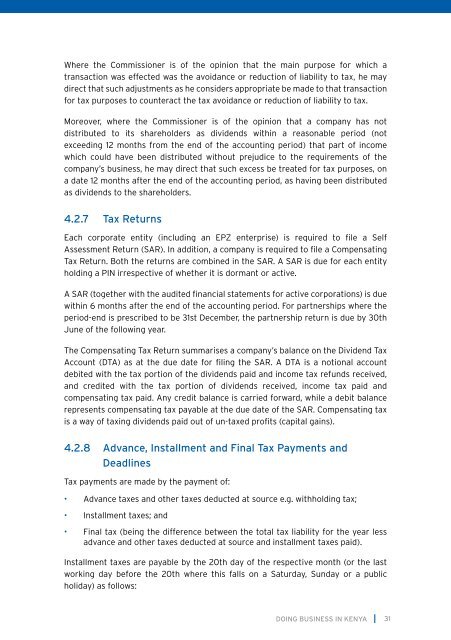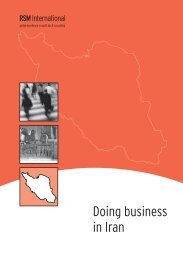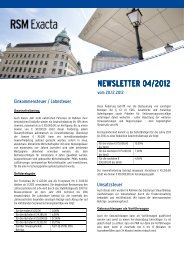Doing Business in Kenya - RSM International
Doing Business in Kenya - RSM International
Doing Business in Kenya - RSM International
- No tags were found...
Create successful ePaper yourself
Turn your PDF publications into a flip-book with our unique Google optimized e-Paper software.
Where the Commissioner is of the op<strong>in</strong>ion that the ma<strong>in</strong> purpose for which atransaction was effected was the avoidance or reduction of liability to tax, he maydirect that such adjustments as he considers appropriate be made to that transactionfor tax purposes to counteract the tax avoidance or reduction of liability to tax.Moreover, where the Commissioner is of the op<strong>in</strong>ion that a company has notdistributed to its shareholders as dividends with<strong>in</strong> a reasonable period (notexceed<strong>in</strong>g 12 months from the end of the account<strong>in</strong>g period) that part of <strong>in</strong>comewhich could have been distributed without prejudice to the requirements of thecompany’s bus<strong>in</strong>ess, he may direct that such excess be treated for tax purposes, ona date 12 months after the end of the account<strong>in</strong>g period, as hav<strong>in</strong>g been distributedas dividends to the shareholders.4.2.7 Tax ReturnsEach corporate entity (<strong>in</strong>clud<strong>in</strong>g an EPZ enterprise) is required to file a SelfAssessment Return (SAR). In addition, a company is required to file a Compensat<strong>in</strong>gTax Return. Both the returns are comb<strong>in</strong>ed <strong>in</strong> the SAR. A SAR is due for each entityhold<strong>in</strong>g a PIN irrespective of whether it is dormant or active.A SAR (together with the audited f<strong>in</strong>ancial statements for active corporations) is duewith<strong>in</strong> 6 months after the end of the account<strong>in</strong>g period. For partnerships where theperiod-end is prescribed to be 31st December, the partnership return is due by 30thJune of the follow<strong>in</strong>g year.The Compensat<strong>in</strong>g Tax Return summarises a company’s balance on the Dividend TaxAccount (DTA) as at the due date for fil<strong>in</strong>g the SAR. A DTA is a notional accountdebited with the tax portion of the dividends paid and <strong>in</strong>come tax refunds received,and credited with the tax portion of dividends received, <strong>in</strong>come tax paid andcompensat<strong>in</strong>g tax paid. Any credit balance is carried forward, while a debit balancerepresents compensat<strong>in</strong>g tax payable at the due date of the SAR. Compensat<strong>in</strong>g taxis a way of tax<strong>in</strong>g dividends paid out of un-taxed profits (capital ga<strong>in</strong>s).4.2.8 Advance, Installment and F<strong>in</strong>al Tax Payments andDeadl<strong>in</strong>esTax payments are made by the payment of:• Advance taxes and other taxes deducted at source e.g. withhold<strong>in</strong>g tax;• Installment taxes; and• F<strong>in</strong>al tax (be<strong>in</strong>g the difference between the total tax liability for the year lessadvance and other taxes deducted at source and <strong>in</strong>stallment taxes paid).Installment taxes are payable by the 20th day of the respective month (or the lastwork<strong>in</strong>g day before the 20th where this falls on a Saturday, Sunday or a publicholiday) as follows:DOING BUSINESS IN KENYA31














